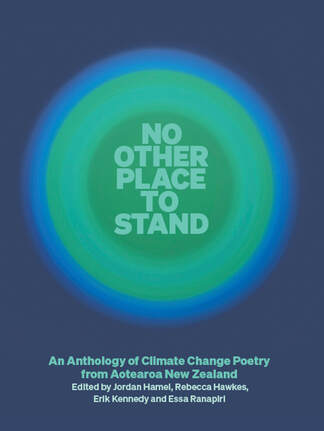
Editors: Jordan Hamel, Rebecca Hawkes, Erik Kennedy, Essa Ranapiri
with a foreword by Alice Te Punga Somerville and afterword by Rod Carr
We are all children of the land. Most of us have long, long forgotten the fact, and this collection is an emphatic reminder of where we came from and where our responsibilities lie.
Appropriately, the call is led by poets of the Pacific, the people who are standing on the shrinking shore, watching the waters crawl up around their ankles; Karlo Mila says, ‘we are the canaries in the coal mines of climate change’ (p 93, ‘Poem for the Commonwealth’).
The collection of 91 poems is a response to a call in 2020 for submissions giving experiences of our threatened world, specifically in New Zealand, when bushfires across the sea were visible here and the pandemic began to take off. It is not a how-to guide on correcting the past, nor is it for the most part an exercise in laying blame: it is a collection of experiences and impressions.
The poems themselves have shapes that range from formal to informal: there is Brent Cantwell’s terzanelle ‘the sounds of Mallacoota’ (p 74) and Craig Santos Perez’ recycling of a Neruda sonnet (p 43). There are concrete, experimental poems from, among others, Tate Fountain (p 157, ‘Countdown’), Tru Paraha (p 134, ‘in my darkling universe’), and Frances Libau (p 199, ‘Escape the Weather’).Tara Black (p 168, ‘Just Right’) presents scenes from a graphic novel. And there’s everything in between: the collection could be used as an illustration of styles.
The poems’ awesome variety of images speak from the vocabulary of Aotearoa, the vocabulary of islands all over the Pacific, the vocabulary of the world-weary, and the vocabulary of an iPhone world. There’s a huge variety of conditions and situations described, and many ways of describing them. Cindy Botha vividly illustrates the awfulness of it all in her image of ‘Hermit Crab in a Doll’s Head’ (p 102); Roman Parrott’s ‘Burn’ (p 138) gives words to a scary and uncompromising over-soul.
So what single message does the book have? The word if floats through the poets’ remarks but goes all over the place from there: if we do this, if we change that, if we stop doing the other.My (personal) reading keeps coming back to a failure of faith: since we can’t erase consuming greed from the human race, retroactively or otherwise, we can at least try to honour each other, even if we do have a private grumble once we get home.
There’s too much expressed here to pick and choose evidence from individuals; rather, I’ll just quote (in its entirety) Craig Santos Perez’ sonnet mentioned earlier, ‘Love in a Time of Climate Change’:
I don’t love you as if you were rare earth metals,
conflict diamonds, or reserves of crude oil that cause
war. I love you as one loves the most vulnerable
species: urgently, between the habitat and its loss.
I love you as one loves the last seed saved
within a vault, gestating the heritage of our roots,
and thanks to your body, the taste that ripens
from its fruit still lives sweetly on my tongue.
I love you without knowing how or when this world
will end. I love you organically, without pesticides.
I love you like this because we’ll only survive
in the nitrogen-rich compost of our embrace,
so close that your emissions of carbon are mine,
so close that your sea rises with my heat.
Editors: Jordan Hamel, Rebecca Hawkes, Erik Kennedy, Essa Rana
Publisher: Auckland University Press
ISBN: 978 1 86940 955 5
RRP: $29.99
Available: bookshops

 RSS Feed
RSS Feed
